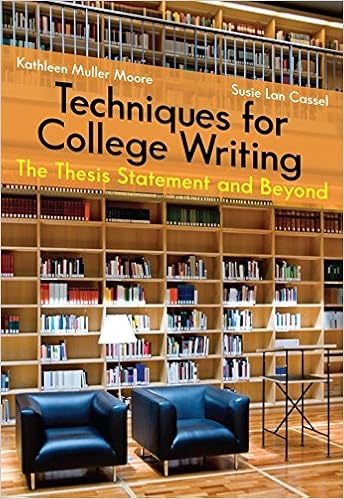
 How much help do you get from AI for your assignments? How do your professors feel about it?
How much help do you get from AI for your assignments? How do your professors feel about it?
Why not read this article by University of Waterloo librarian Kari Weaver, which offers a possible solution that upholds your scholarly integrity while transparently revealing the tech assistance you use.
Remember that each instructor will have their own unique AI/no-AI policy, so discuss your options for every course!
The Artificial Intelligence Disclosure (AID) Framework: An Introduction
Weaver, K. D. (2024). The artificial intelligence disclosure (AID) framework: An introduction. C&RL News, 85(10), 407-411. https://crln.acrl.org/index.php/crlnews/article/view/26548
Thanks to Fadia Al Akhras, Librarian and Professor Stavros Hadjisolomou for highlighting this article.
 Techniques for College Writing
by
Techniques for College Writing
by
 Writing with Power: Techniques for Mastering the Writing Process
by
Writing with Power: Techniques for Mastering the Writing Process
by
 Keep your work intact - avoid plagiarism!
Keep your work intact - avoid plagiarism!
Plagiarism is using someone else's work and passing it off as one's own. The term comes from the Latin word plagiarius, which means 'kidnapper' (Menager-Beeley, R., & Paulos, L. (2006). Understanding plagiarism: A student guide to writing your own work. Boston: Houghton Mifflin).
Maintain the integrity of your unique voice and original ideas by clearly marking your external sources, whether you're directly quoting or paraphrasing lines to support your work. Avoid the consequences of plagiarism with these simple solutions:

Consider your thesis statement to be the one-line or one-sentence idea that both
summarizes all your arguments and discussions and also, most importantly,
serves as the 'core' idea that is driving your paper. These links help you think
about, formulate, and polish your thesis statement:
Reduce your assignment-related stress by following concrete, actionable steps to
tackle your assignment from the moment you receive it, ensuring you're
prepared before you even begin writing. These links offer practical advice on how
to get started on any writing project, from understanding your professor's
expectations to deciding how you'll respond:
Study this overview of the writing process courtesy of Excelsior University's Online Writing Lab:
 From brainstorming to finishing touches: Factsheets
From brainstorming to finishing touches: Factsheets
Academic writing is a little different from your everyday speech or even messaging, and your professors want to see you make the most of your critical thinking and unique perspectives, as well as your ability to incorporate research and clearly, compellingly present what you have to say. But don't panic - with every assignment you will be practicing your skills and getting used to the 'writing process.' Check out some of the below factsheets from BBC Skillswise, that help you keep in mind the key structural requirements and time-tested steps to ensure you present your best work yet!